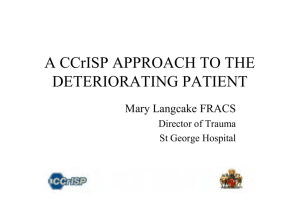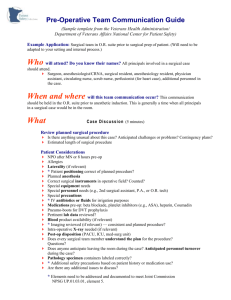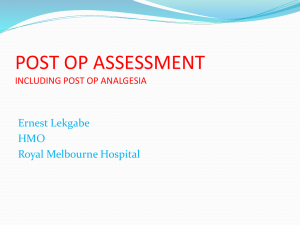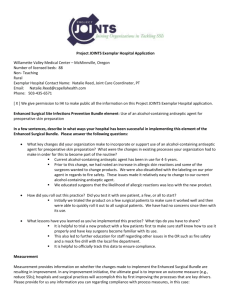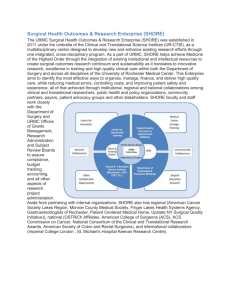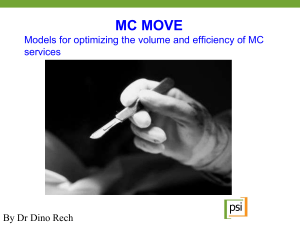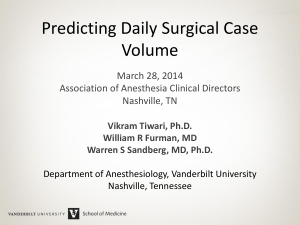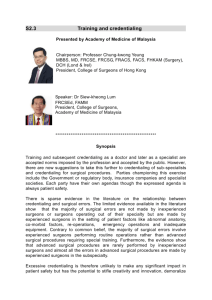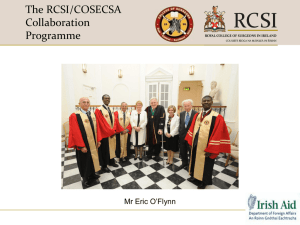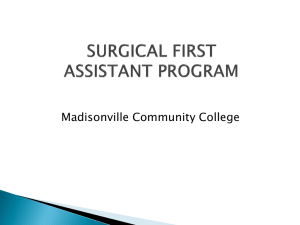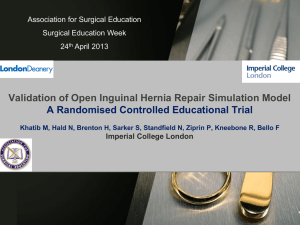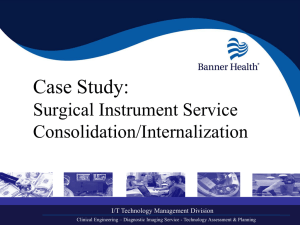Post-operative Complications
advertisement
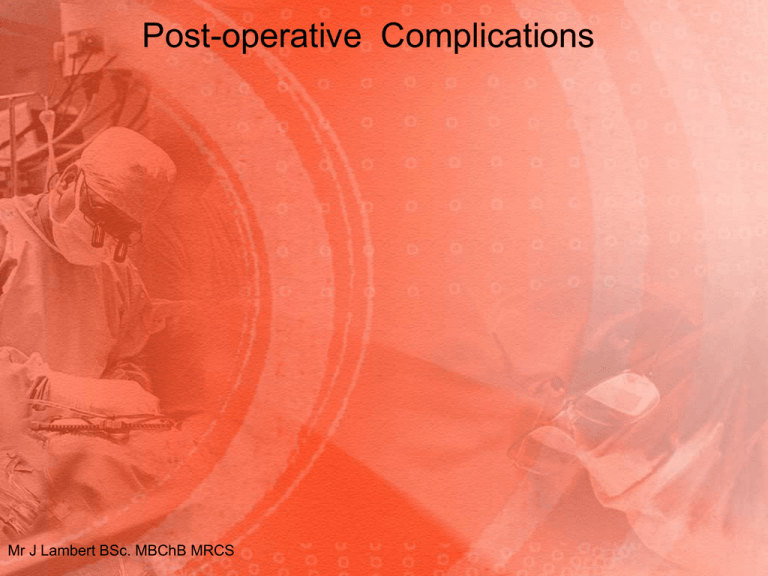
Post-operative Complications Mr J Lambert BSc. MBChB MRCS Contents • Introduction • Classifications • Case study 1 • Case study 2 • Case study 3 • Case study 4 • Quiz • Summary Introduction “all expected/unexpected adverse events from leaving theatre” Classifications • Immediate/Early/Late • Systemic: neurological/respiratory/cardiovascular/ga strointestinal/urological/endocrine/haematologi cal Case Study 1 • you are the surgical F1(in 2 years time) • 21 yr old female, 5 hrs post lap chole: tachycardic (110), cool peripheries, BP:90/50, Urine output 30mls/hr, complaining of abdo pain • How would you manage this patient? CCrISP (Care of the Critically ill Surgical Patient (Royal College of Surgeons) Immediate management ABCDE Full Patient Assessment chart review, history, examination, results, scans Decide and Plan Stable Patient (Daily Management Plan) Unstable Patient/Unsure(Dia gnosis Required)Specific Investigations Definitive Care(Medical, Surgical, Radiological) Case Study 1 • you are the surgical F1(in 2 years time) • 21 yr old female, 5 hrs post lap chole: tachycardic (110), cool peripheries, BP:90/50, Urine output 30mls/hr, complaining of abdo pain • How would you manage this patient? Haemorrhagic Shock Parameters I II III IV Bloods loss(ml) <750 750-1500 1500-2000 >2000 Blood loss(%) <15 15-30 30-40 >40 Heart rate <100 >100 >120 >140 Blood Pressure normal orthostatic hypotension severe hypotension Urine output(ml) >30 20-30 5-15 negligible CNS symptoms normal anxious confused obtunded what you may see? Case Study 2 • In 4 years time you are the surgical SHO on a busy colorectal firm • You are called to see a 54 yr old man post anterior resection for rectal cancer.He is 2 days post op, abdomen is distended, nurse reports 1L vomiting. not passing flatus or opening bowels yet. • How would you manage this patient? CCrISP (Care of the Critically ill Surgical Patient (Royal College of Surgeons) Immediate management ABCDE Full Patient Assessment chart review, history, examination, results, scans Decide and Plan Stable Patient (Daily Management Plan) Unstable Patient/Unsure(Dia gnosis Required)Specific Investigations Definitive Care(Medical, Surgical, Radiological) you order an abdominal film do not confuse with Case study 3 • your F2 colleague has asked you to chase the bloods for the previous colorectal patient. It is now day 6 and the ileus has resolved. He was ready for discharge today but has suddenly spiked a temp of 38. His abdomen has become peritonitic. • Bloods: WCC:23 CRP:300 Creat :200 Urea:9 • How would you manage this patient? CCrISP (Care of the Critically ill Surgical Patient (Royal College of Surgeons) Immediate management ABCDE Full Patient Assessment chart review, history, examination, results, scans Decide and Plan Stable Patient (Daily Management Plan) Unstable Patient/Unsure(Dia gnosis Required)Specific Investigations Definitive Care(Medical, Surgical, Radiological) Your Registrar asks you to book a CT Case Study 4 • Your patient is managed conservatively. It is now day 25 of his enhanced recovery? His pre-sacral collection is drained radiologically. He has a long course of antibiotics and is now fit for discharge. • He has been complaining of diarrhoea and you notice a fruity, sickly smell and his abdominal pain has returned • How would you manage this patient? CCrISP (Care of the Critically ill Surgical Patient (Royal College of Surgeons) Immediate management ABCDE Full Patient Assessment chart review, history, examination, results, scans Decide and Plan Stable Patient (Daily Management Plan) Unstable Patient/Unsure(Dia gnosis Required)Specific Investigations Definitive Care(Medical, Surgical, Radiological) Quiz (Spot post-operative complication diagnosis) Summary • Be able to classify post-op complications • Think systematically (ABCDE) • Early basic management saves lives Thanks • Questions • Email: joellambert@doctors.org.uk
